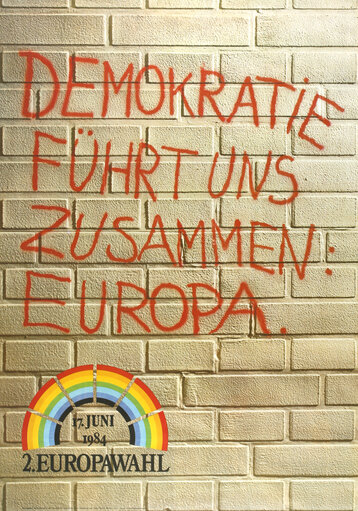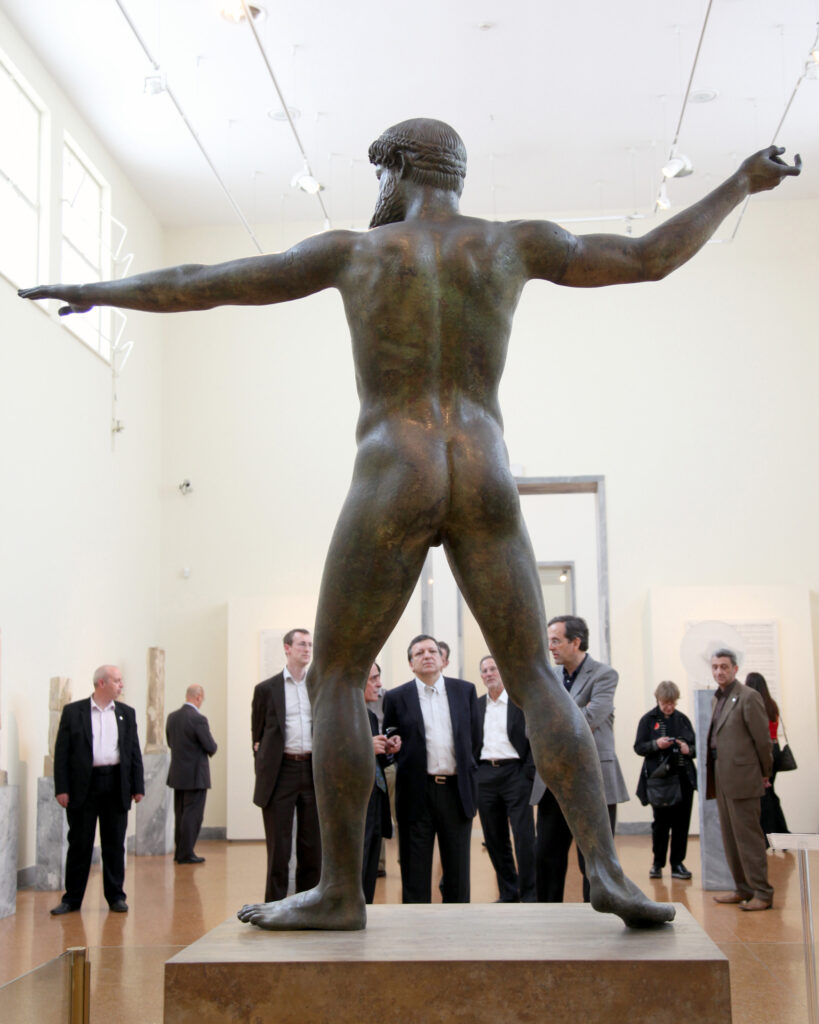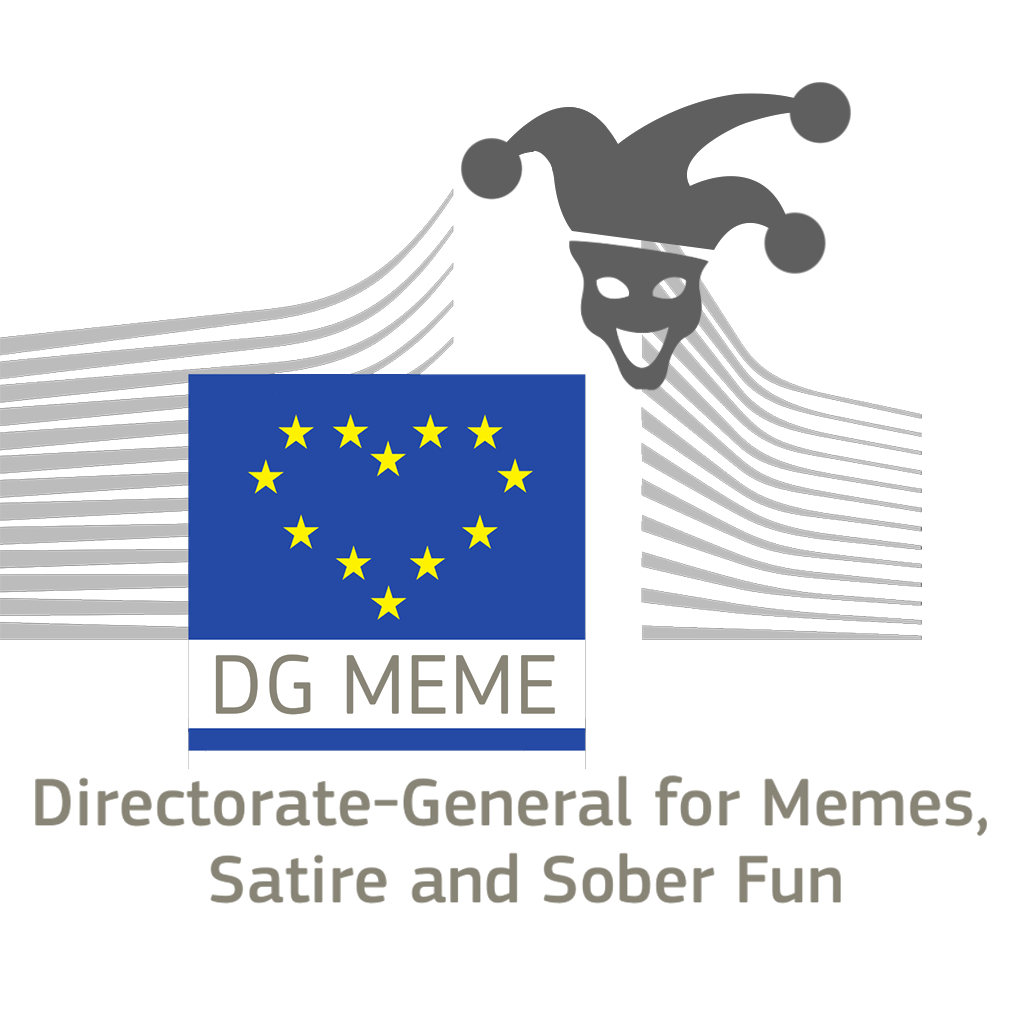The European Elections are not only one of the biggest democratic exercises in the world, they are also a huge communication campaign with the same goal since 1979: get people to vote.
Join us in a roller-coaster of nostalgia, pain and joy to discover the evolution of the Parliament efforts. 10 European elections, 10 communication campaigns, uncountable slogans and videos for you to enjoy.
1979 – Hope
Copyright: European Parliament
The first European and the first international elections in history, the one everybody expected with curiosity; the hopes were high with the “Community”. Everything was to be built in terms of communication.
People writing their future on the ballot with a giant pencil as the main character for the various videos and posters. Different slogans in different countries with ‘Your voice’ and ‘future’ being the most used terms, followed by ‘hope’, ‘build’. ‘choose’ and ‘together’.
As they still do today, the Commission and the Parliament teamed up to organize a massive information campaign tailored to each country… And there was funding for broadcast and media to inform about the elections.
The turnout was around 63%, the highest ever in the history of the EU elections. As they were the first elections, we dedicated a specific post to them.
1984 – Europe, do you hear me?
Copyright: European Parliament

The second elections saw an increase in the number of Parliament seats and a decrease in the turnout (61%), which kept falling in every election until 2014. The first far-right group also appeared (the European Right, made by the French National Front plus the Italian Social Movement) together with the Rainbow coalition (Green plus Regionalists). This was also the first EU elections for Greece and we see slogans about ‘voice’, ‘democracy’ and ‘unity’.
Special mention to the UK Office of the Parliament for launching a very British video called What are you voting for… supposedly to encourage people to go to the polls. Here an extract of this beauty:
Copyright: European Parliament
1989 – Alan’s Psychedelic Elections
If you were expecting some strident music and 3D/psychedelia elements because of the 90s being around the corner, you will not be disappointed.
Copyright: European Parliament
The first EU Elections for Portugal and Spain (and the third victory in a row for the Socialists). The Mediterranean country even managed to get one of theirs as President of the EP, Enrique Barόn Crespo.
In this election we see more direct slogans, with the word ‘Election’ as the anchor for the campaign, though the approach of using several slogans rather than one remained. So “your voice” still appeared and it will remain the most repeated slogan in the EU campaigns.
1994 – Peace, vote and bash the EU from within
Many things happened since the last elections: the end of Communism in Europe, the Reunification of Germany, the dissolution of the Soviet Union, the Velvet Divorce in Czechoslovakia and the breakup of Yugoslavia. Austria, Finland and Sweden applied to join the EU, which just recently adopted, amid controversies, the Treaty of Maastricht.
The dove of peace started to appear as a symbol of the EU and as a symbol of the election campaign. But also ‘Your voice and ‘Vote!’ remained as slogans. An unanswered call: the turnout continued to drop.
Copyright: European Parliament
EPP and European Democrats merged in a single group looking to expand and win for once the EU elections (they did not). And a new group was founded: the Europe of Nations Group, the first Eurosceptic group in the Parliament, which lasted until 1996.
1999 – United in Boredom
Unity was the message. Europe as a whole, the mantra. The EU started to be perceived as a superpower in the world scene. And if you wanted to act as one, you needed to be united.
Copyright: European Parliament
The 1999 elections were held among fifteen EU countries this time. More seats, less votes and a change of power, with the EPP winning for the first time. They have won all European elections since then.
In this year, Sarkozy, Farage, Nick Clegg, Helle Thorning-Schmidt and Hollande were elected as MEPsA Member of the European Parliament (abbr. MEP) is the living proof that eurocrats are elected by the people, as in every well-functioning democracy. They change every five years, which is more or less the time they need to get a basic idea of how the European Union works. They..., but the election campaign was so boring that the turnout fell below 50% for the first time. A change in the approach and communication was needed.
2004 – The new Europe
Following the EU enlargementOutside the EU Bubble, the term is used by anyone who wishes to undergo surgery in order to increase their attractiveness visavi potential sexual partners. Within said bubble, enlargement means adding more countries to the 28 27 of the European Union, thus promoting their status from third country to member..., the European elections became the biggest transnational direct election in history. More than 340 million people were eligible to vote, the second largest electorate in the world after India.
It was all about voting for “the new Europe”.
Copyright: European Parliament

Copyright: European Communities 2009
According to the European Constitution, the CouncilThe Council of the European Union and The European Council have two things in common: the name and the fact that they represent the position of their member state's executive. To avoid confusion, we thought of grouping the two definitions in the same page: understanding by the context to which... would have to take into account the results of the elections when selecting the Commission President. And the Parliament would “elect”, rather than approve, the Council’s proposal. It was the parliamentary groups opportunity to express lead candidates but they didn’t, with the exception of the Greens. The CouncilThe Council of the European Union and The European Council have two things in common: the name and the fact that they represent the position of their member state's executive. To avoid confusion, we thought of grouping the two definitions in the same page: understanding by the context to which... in the end selected Durao Barroso from the political family that won the election.
Later on, the European Constitution was killed, making it clear to everyone that the “new Europe” was the same as the old Europe.
2009 – A new paradigm
Thirty years later, Europeans got to see another proper communication campaign for the elections. ‘It’s your choice’ was the main slogan and the messages focused on the importance of the decisions taken by the European Parliament at EU level… and how they affected the every day life of Europeans.
The first elections of our beloved Jaume Duch as spokesperson.
Copyright: European Parliament
Under the innovative “There’s always time to vote” umbrella, the European Parliament released a series of videos that played with humor, surprise and fast-paced editing.
Copyright: European Parliament
In this election, for the first time, the European Parliament reached out to celebrities to encourage people to vote. Don’t miss Luís Figo’s motivational speech.
Despite of all the efforts, the turnout dropped again, but the foundations for the future campaigns was established.
2014 – The Lead Candidates
The never ending “EU at risk” mantra was repeated so much that people started to believe it this time. also seeing the rise in left- and right-wing extremism. The EU was losing impact, support, and credibility, both on the political and communicative point of view. Some change was needed.
For the first (and only) time in history, candidates for President of the Commission, known as Spitzenkandidaten (lead candidates), were chosen in advance by their political groups. This was followed by discussions on the election programmes, live debates among candidates and proper political campaigns. Probably, the most engaging elections to date, at least that’s how it was felt in BrusselsBrussels (abbr. BRU, French: Bruxelles; Dutch: Brussel), officially the Brussels-Capital Region (French: Région de Bruxelles-Capitale; Dutch: Brussels Hoofdstedelijk Gewest), is a region of Belgium comprising 19 municipalities, including the City of Brussels, which is the capital of Belgium. The Brussels-Capital Region is located in the central portion of the country....
The EPP won again and Jean-Claude Juncker was nominated and then elected as Commission President. Only Viktor Orbán and David Cameron voted against him in the CouncilThe Council of the European Union and The European Council have two things in common: the name and the fact that they represent the position of their member state's executive. To avoid confusion, we thought of grouping the two definitions in the same page: understanding by the context to which....
On the communication side, Social Media was used for the first time for EU political campaign. The main slogan was ‘Act. React. Impact’, a call to stop talking and start doing things, for the politicians, and to stop complaining and start participating, for the people.
The Parliament decided to put extra efforts and resources to reach out to young Europeans: using the hastagh #myfirsttime and the video ‘And then came a lot of sheep’ they tried to be innovative.
Juncker did the same, touring around Europe on a bus, and featuring on a video which is still funny to watch.
Juncker won, the first and only President of the European Commission elected directly by the people. He opened a Twitter account, though he never tweeted once himself. Still, he was the star of the Social Media show during the entire mandate.
2019 – The failure of the lead candidates
The EU always finds its way to disappoint you; no matter how much you love the project, there will always be a regulation, a directive, an acronym, a Commissioner, a Charles Michel… something, someone, that will disappoint you. In 2019, it was the CouncilThe Council of the European Union and The European Council have two things in common: the name and the fact that they represent the position of their member state's executive. To avoid confusion, we thought of grouping the two definitions in the same page: understanding by the context to which....
During the elections, we thought we were actually listening, reading about and electing the President of the Commission. BrusselsBrussels (abbr. BRU, French: Bruxelles; Dutch: Brussel), officially the Brussels-Capital Region (French: Région de Bruxelles-Capitale; Dutch: Brussels Hoofdstedelijk Gewest), is a region of Belgium comprising 19 municipalities, including the City of Brussels, which is the capital of Belgium. The Brussels-Capital Region is located in the central portion of the country... was overexcited to see two of their most beloved politicians, Frans Timmermans and Margrethe Vestager competing for the EU Top Job. The communication campaign was all about the impact of EU policies in our daily lives, the Parliament managed to involve youth associations all around Europe to engage and listen to young people. They also published a very cringe video, which made DG MEME so angry to produce a video in response:
Celebrities were also encouraging everyone to go to vote; it was the honeymoon of EU democracy. Under the This Time I am voting campaign, everyone seemed ready to go to the polls. The focus was on the EU project; the decision was on the European people; the headlines were about the candidates. And the turnout got up, something that our beloved national leaders cannot cope with. They must be the protagonist…
With the results in their hands, the Council met to decide. The EPP was the most voted group, but Weber, their lead candidate, was not very appreciated. In those hours, in the corridors, everything seemed clear: Timmermans had to be the chosen one. “Get ready to announce it”. So everything was ready…until the lead candidate model collapsed.
Ursula von der Leyen had been appointed, unanimously, by the CouncilThe Council of the European Union and The European Council have two things in common: the name and the fact that they represent the position of their member state's executive. To avoid confusion, we thought of grouping the two definitions in the same page: understanding by the context to which.... “Ursula who?” was the most heard sentence that day. Headlines and criticism all around, with the European Parliament saying they will only elect a lead candidate. Finally, with a bit of persuasion and with just nine votes above the threshold, Ursula von der Leyen became the first women elected President of the Commission.
2024 – Tenth Time Around
This year, it is ten times Europeans have been called to elect their common Parliament. The effort of the last years saw an increase in turnout and a bit of trust from the citizens. How do we destroy all that? By definitively burying the lead candidates process.
The communication campaign this year can be seen as a continuation of the good recipes implemented in the last two editions: a focus on the distribution channels, a tailored-made and localized message based on the age group, a powerful media coverage, and a continuous highlight of the impact of EU policies in the life of the many.
The 2024 video is not about Europe, is about democracy. It is a call to young voters to defend it. We will find out quite soon whether the call of this four minutes video will be answered.
“Your voice”, “make yourself heard”, “it is your chance”, “your decision” are still there, with a new component this time: never take democracy for granted.
From 6 to 9 June, in your country.
But let’s not forget that the EU is an everyday project.
The EU is being made every single day, with every decision your government takes at national level. With every proposal the Commission makes. With every declaration the Parliament publish. With every time the CouncilThe Council of the European Union and The European Council have two things in common: the name and the fact that they represent the position of their member state's executive. To avoid confusion, we thought of grouping the two definitions in the same page: understanding by the context to which... decides. And that the EU cannot be made against EU countries, but with them. It is and it will always be what the EU countries want it to be. And the EU countries will be, whatever its people decide it to be.

1 reply on “The history of the European Elections through their communication campaigns”
Very interesting! And the last video also veeeery moving!